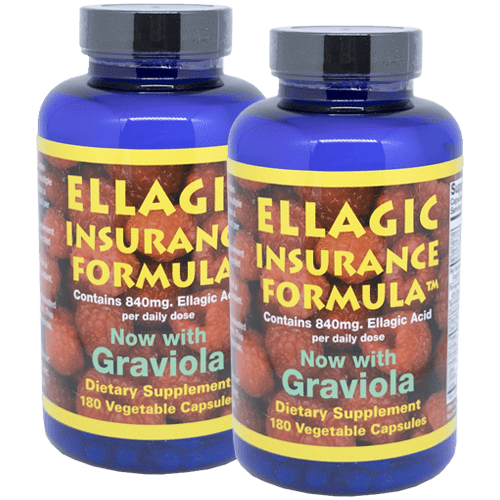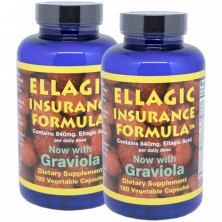Ellagic Insurance Formula
While we can’t escape free radical exposure, antioxidants are known to be one of our best defenses and our EIF is an EXTREMELY POTENT Super Antioxidant formula.

Why are Antioxidants Important

Antioxidants are substances that protect your body from the effects of unstable molecules called free radicals. Free radicals develop when atoms in your body gain or lose charged particles called electrons. When free radicals outnumber antioxidants, it can lead to a state called oxidative stress.
Prolonged oxidative stress can damage your DNA and other important molecules in your body. This damage can eventually lead to an increased risk of negative health outcomes, including cancer, heart disease, cognitive decline, and vision loss.
Do Our Diets Provide enough Antioxidants

The short answer to that question, for the vast majority of the population today, is a big NO for one simple reason.
150 years ago our diets primarily consisted of actual food that was provided to us by nature. We ate a balanced diet of fruits, vegetables and meats that were loaded with antioxidants.
Today, however, many of us primarily consume over processed food-like substances loaded down with added sugar and all sorts of chemical concoctions. These junk foods, developed in a laboratory, bear no resemblance whatsoever to what nature provided our ancestors.
The bottom line is that the average diet today has less than 10% of the natural antioxidant content our great grandparents obtained from their diets and our disease rates are skyrocketing as a direct result.
Do Our Diets Affect Our Overall Wellbeing and Longevity

To answer that question, lets take a look at the historical records.
Back in 1900 the leading causes of death in the United States were infectious diseases, including: Pneumonia and influenza, Tuberculosis (TB), Diarrhea and enteritis, and Diphtheria. These four diseases accounted for about one third of all deaths in 1900, with 40% of those deaths occurring in children under five years old. Advances in medical technology have virtually eliminated all of them today.
Today, however, we have a whole new set of leading causes of death that, with the exception of accidents, were not prevalent 124 years ago.
Heart disease: The leading cause of death in the US, responsible for about 1 in 4 deaths.
Cancer: The second leading cause of death, accounting for about 18% of deaths in 2020.
Accidents: The third leading cause of death, which can include unexpected accidents like a fall or a heart attack. (Seriously heart attacks are recorded as accidents).
As the primary change to our lifestyles over the last 124 years has been what we consume in our diets, the obvious answer is a big YES.
The Ellagic Insurance Formula - The Antioxidant Solution

The Ellagic Insurance Formula is based on ground-breaking research suggesting that extracts of certain plant phytochemicals have therapeutic healing effects in the body that are often greater than the physiological benefits experienced from eating the whole plant or the average daily amount of fruits and vegetables traditionally consumed in the Standard American Diet.
This unique nutraceutical supplement combines therapeutic levels of polyphenols from many different plants: ellagitannins (Ellagic Acid) from Raspberries, Pomegranates and Terminalia Chebula; oligomeric proanthocyanidins (OPC) from whole grape extract; catechins from Green Tea and Graviola.
To further enhance the effectiveness we then included 7 Plant Based Digestive Enzymes; together with the antioxidant vitamins A, C, E and the mineral Selenium to create an EXTREMELY POTENT antioxidant formula.
There is a reason, that for the past 24 years, 75% of our product orders have been from holistic medical practitioners.

To better understand just how powerful a product the Ellagic Insurance Formula is, please take the time to listen to the audio below.
While this was recorded on Public Health Radio back in 2002, the information it provides is just as relevant today.
Ellagic Acid Interview
Red Raspberry Powder: 514 mg Ellagitannins / Ellagic Acid
Pomegranate Extract: 686 mg Standardized to 70% Ellagic Acid.
Provides 480mg Ellagic Acid.
Terminalia Chebula Extract: 400 mg Standardized to 90% Ellagic Acid.
Provides 360mg Ellagic Acid.
Graviola: 600 mg
Whole Grape Extract: 100 mg provides Biovin OPC & Resveratrol
Green Tea Catechin: 100 mg
Vitamin A: 5000 IU as Natural Beta Carotene
Vitamin C: 60 mg as Ascorbic Acid
Vitamin E: 30 mg as d-alpha tocopherol succinate
Selenium: 200 mcg as Selenomethionine
Enzymatic Delivery System:
Protease: 48,000 HUT
Amylase: 7,200 SKB
Bromelain: 600,000 PU
Invertase: 90 Sumner
Lipase: 320 FIP
Cellulase: 420 CU
Lactase: 90 ALU
Q) What is the recommended daily dose?
A) 6 capsules per day.
Q) What is the recommended time to take the product?
A) It makes no difference. Some people take all 6 first thing in the morning and some split the dosage into two 3 capsule doses morning and afternoon.
Q) Is the product a “Clean Label” product?
A) Yes, the Ellagic Insurance Formula is encapsulated in vegetable capsules and is a totally “Clean Label” product.
If you are unfamiliar with this term, it means that there is nothing in the product except the natural ingredients. NO chemical binders, fillers, or preservatives whatsoever are used. While we still need to use flowing agents in the production processes, we use only ORGANIC Rice Bran and Rice Concentrate.
The potential benefits of consuming Ellagic Acid have been studied for well over 30 years, with some very interesting conclusions being reached.
As an example, this article is from PubMed Central on the USA National Library of Medicine website.
The Abstract: Cancer is a leading cause of death worldwide. Cancer treatments by chemotherapeutic agents, surgery, and radiation have not been highly effective in reducing the incidence of cancers and increasing the survival rate of cancer patients. In recent years, plant-derived compounds have attracted considerable attention as alternative cancer remedies for enhancing cancer prevention and treatment because of their low toxicities, low costs, and low side effects. Ellagic acid (EA) is a natural phenolic constituent. Recent in vitro and in vivo experiments have revealed that EA elicits anticarcinogenic effects by inhibiting tumor cell proliferation, inducing apoptosis, breaking DNA binding to carcinogens, blocking virus infection, and disturbing inflammation, angiogenesis, and drug-resistance processes required for tumor growth and metastasis. This review enumerates the anticarcinogenic actions and mechanisms of EA. It also discusses future directions on the applications of EA.
The full article is well worth reading and may be found here: https://pmc.ncbi.nlm.nih.gov/articles/PMC4069806/
Listed below are just a few more of those studies. Right click on the Red links to open them in another window.
- Details of 10 Ellagic Acid studies. https//:www.sciencedirect.com/topics/agricultural-and-biological-sciences/ellagic-acid
- Improvements in Metabolic Health with Consumption of Ellagic Acid and Subsequent Conversion into Urolithins: Evidence and Mechanisms https:/pmc.ncbi.nlm.nih.gov/articles/PMC5015040/
- Atta UR, et al. New antioxidant and antimicrobial ellagic acid derivatives from Pteleopsis hylodendron. Planta Medica 2001;67:335-9.
- Akiyama H, et al. Antibacterial action of several tannins against Staphylococcus aureus. J Antimicrob Chemother 2001;48:487-91.
- Tanaka T, et al. Inhibitory effect of ellagic acid on N-2-fluorenylacetamide-induced liver carcinogenesis in male ACI/N rats. Jpn J Cancer Res 1988;79:1297-303.
- Stoner GD, et al. Isothiocyanates and freeze-dried strawberries as inhibitors of esophageal cancer. Toxicol Sci 1999;52(2 Suppl):95-100.
- Narayanan BA, et al. Interactive gene expression pattern in prostate cancer cells exposed to phenolic antioxidants. Life Sci 2002;70:1821-39.
- Narayanan BA, Re GG. IGF-II down regulation associated cell cycle arrest in colon cancer cells exposed to phenolic antioxidant ellagic acid. Anticancer Res 2001;21:359-64.
- Basu A, Wilkinson M, Penugonda K, et al. Freeze-dried strawberry powder improves lipid profile and lipid peroxidation in women with metabolic sndrome: baseline and post intervention effects. Nutr Journal. 2009 Sept;8:43.
- Festa F, et al. Strong antioxidant activity of ellagic acid in mammalian cells in vitro revealed by the comet assay. Anticancer Res 2001;21:3903-8.
- Hagiwara Y, Kasukabe T, Kaneko Y, Niitsu N, Okabe-Kado J. Ellagic acid, a natural polyphenolic compound, induces apoptosis and potentiates retinoic acid-induced differentiation of human leukemia HL-60 cells. Int J Hematol. 2010 Jul;92(1):136-43.
- Adams LS, Zhang Y, Seeram NP, Heber D, Chen S. Pomegranate ellagitannin-derived compounds exhibit anti proliferative and anti-aromatase activity in breast cancer cells in vitro. Cancer Prev Res. 2010 Jan;3(1):108-113.
- Siglin JC, et al. Effects of dietary phenethyl isothiocyanate, ellagic acid, sulindac and calcium on the induction and progression of N-nitrosomethylbenzylamine-induced esophageal carcinogenesis in rats. Carcinogenesis 1995;16:1101-6.
- Narayanan BA, et al. p53/p21(WAF1/CIP1) expression and its possible role in G1 arrest and apoptosis in ellagic acid treated cancer cells. Cancer Lett 1999;136:215-21.
- Barch DH, Rundhaugen LM. Ellagic acid induces NAD(P)H:quinone reductase through activation of the antioxidant responsive element of the rat NAD(P)H:quinone reductase gene. Carcinogenesis 1994;15:2065-8.
- Zhang Z, et al. Inhibition of liver microsomal cytochrome P450 activity and metabolism of the tobacco-specific nitrosamine NNK by capsaicin and ellagic acid. Anticancer Res 1993;13:2341-6.
- Barch DH, et al. Dietary ellagic acid inhibits the enzymatic activity of CYP1A1 without altering hepatic concentrations of CYP1A1 or CYP1A1 mRNA. Biochem Biophys Res Commun 1994;201:1477-82.
- Boukharta M, Jalbert G, Castonguay A. Biodistribution of ellagic acid and dose-related inhibition of lung tumorigenesis in A/J mice. Nutr Cancer 1992;18:181-9.
- Doyle B, Griffiths LA. The metabolism of ellagic acid in the rat. Xenobiotica 1980;10:247-56.
- Liu Y, Yu S, Wang F, et al. Chronic administration of ellagic acid improved the cognition in middle-aged overweight men. Appl Physiol Nutr Metab. 2018 Mar;43(3):266-273.
- Istas G, Feliciano RP, Weber T, et al. Plasma urolithin metabolites correlate with improvements in endothelial function after red raspberry consumption: A double-blind randomized controlled trial. Arch Biochem Biophys. 2018 Aug 1;651:43-51.
- Li Z, Henning SM, Lee RP, et al. Pomegranate extract induces ellagitannin metabolite formation and changes stool microbiota in healthy volunteers. Food Funct. 2015 Aug;6(8):2487-95.
- Paller CJ, Rudek MA, Zhou XC, et al. A phase I study of muscadine grape skin extract in men with biochemically recurrent prostate cancer: Safety, tolerability, and dose determination. Prostate. 2015 Oct;75(14):1518-25.
- Ghadimi M, Foroughi F, Hashemipour S, et al. Randomized double-blind clinical trial examining the Ellagic acid effects on glycemic status, insulin resistance, antioxidant, and inflammatory factors in patients with type 2 diabetes. Phytother Res. 2021 Feb;35(2):1023-1032.
- Mirzaie Z, Bastani A, Haji-Aghamohammadi AA, et al. Effects of Ellagic Acid on Oxidative Stress Index, Inflammatory Markers and Quality of Life in Patients With Irritable Bowel Syndrome: Randomized Double-blind Clinical Trial. Clin Nutr Res. 2022 Apr 27;11(2):98-109.
- Mirzaie Z, Bastani A, Hesami S, Pouryousefi E, Kavianpour M, Haghighian HK. Improving Effect of Ellagic Acid on Sleep Quality and Gastrointestinal Symptoms in Patient With Irritable Bowel Syndrome: Randomized Double-Blind Clinical Trial. Turk J Gastroenterol. 2021 Nov;32(11):937-944.


